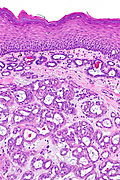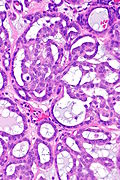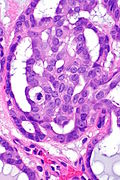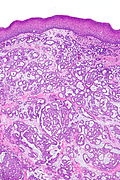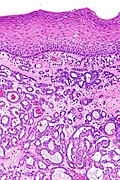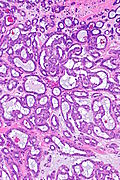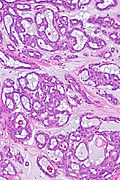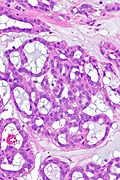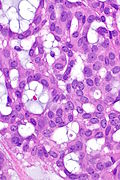Cribriform adenocarcinoma of the minor salivary gland
Jump to navigation
Jump to search
| Cribriform adenocarcinoma of the minor salivary gland | |
|---|---|
| Diagnosis in short | |
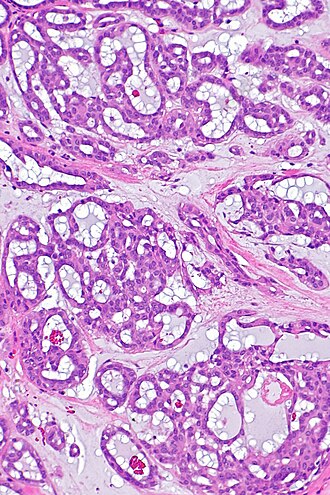 Cribriform adenocarcinoma of the minor salivary gland. H&E stain. | |
|
| |
| Synonyms | cribriform adenocarcioma of the tongue |
|
| |
| LM | cribriform and solid architecture, cytology similar to papillary thyroid carcinoma (irregular nuclear membranes, nuclear overlap), usually covered by an intact squamous epithelium |
| LM DDx | polymorphous low grade adenocarcinoma, papillary thyroid carcinoma |
| IHC | CK7 +ve, vimentin +ve, CD117 -ve/+ve, S-100 +ve |
| Site | head and neck - usually tongue |
|
| |
| Prevalence | very rare |
| Prognosis | good |
| Clin. DDx | other salivary gland tumours |
| Treatment | excision |
Cribriform adenocarcinoma of the minor salivary gland, abbreviated CAMSG, is a rare malignancy of the salivary gland, typically of the tongue.[1]
It is also known as cribriform adenocarcioma of the tongue, abbreviated CAT.
General
- Rare - small case series and case reports.
- Typically tongue - first described there.[2]
- Good prognosis[1] - on limited data.
Microscopic
Features:
- Typically covered by an intact squamous epithelium.[1]
- Growth patterns - cribriform and solid.
- Cytology similar to papillary thyroid carcinoma.[1]
- Irregular nuclear membranes (raisin-like nuclei).
- Nuclear overlap.
DDx:
- Polymorphous low grade adenocarcinoma - morphology more varied.
- Papillary thyroid carcinoma.
Images
www
IHC
Features:[1]
- AE1/AE3 +ve (12/12 cases).
- CAM5.2 +ve (12/12 cases).
- CK7 +ve (12/12 cases).
- CK8 +ve (12/12 cases).
- CK18 +ve (12/12 cases).
- S-100 +ve (12/12 cases).
- Vimentin +ve (12/12 cases).
- CD117 -ve/+ve (5+ve/12 cases).
Molecular
- Rearrangement of the PRKD genes (PRKD1, PRKD2, PRKD3).[4]
See also
Referencess
- ↑ 1.0 1.1 1.2 1.3 1.4 Skalova, A.; Sima, R.; Kaspirkova-Nemcova, J.; Simpson, RH.; Elmberger, G.; Leivo, I.; Di Palma, S.; Jirasek, T. et al. (Aug 2011). "Cribriform adenocarcinoma of minor salivary gland origin principally affecting the tongue: characterization of new entity.". Am J Surg Pathol 35 (8): 1168-76. doi:10.1097/PAS.0b013e31821e1f54. PMID 21716087.
- ↑ Michal, M.; Skálová, A.; Simpson, RH.; Raslan, WF.; Curík, R.; Leivo, I.; Mukensnábl, P. (Dec 1999). "Cribriform adenocarcinoma of the tongue: a hitherto unrecognized type of adenocarcinoma characteristically occurring in the tongue.". Histopathology 35 (6): 495-501. PMID 10583573.
- ↑ 3.0 3.1 Michal, M.; Kacerovska, D.; Kazakov, DV. (Jul 2013). "Cribriform adenocarcinoma of the tongue and minor salivary glands: a review.". Head Neck Pathol 7 Suppl 1: S3-11. doi:10.1007/s12105-013-0457-9. PMID 23821209.
- ↑ Weinreb, I.; Zhang, L.; Tirunagari, LM.; Sung, YS.; Chen, CL.; Perez-Ordonez, B.; Clarke, BA.; Skalova, A. et al. (Oct 2014). "Novel PRKD gene rearrangements and variant fusions in cribriform adenocarcinoma of salivary gland origin.". Genes Chromosomes Cancer 53 (10): 845-56. doi:10.1002/gcc.22195. PMID 24942367.

